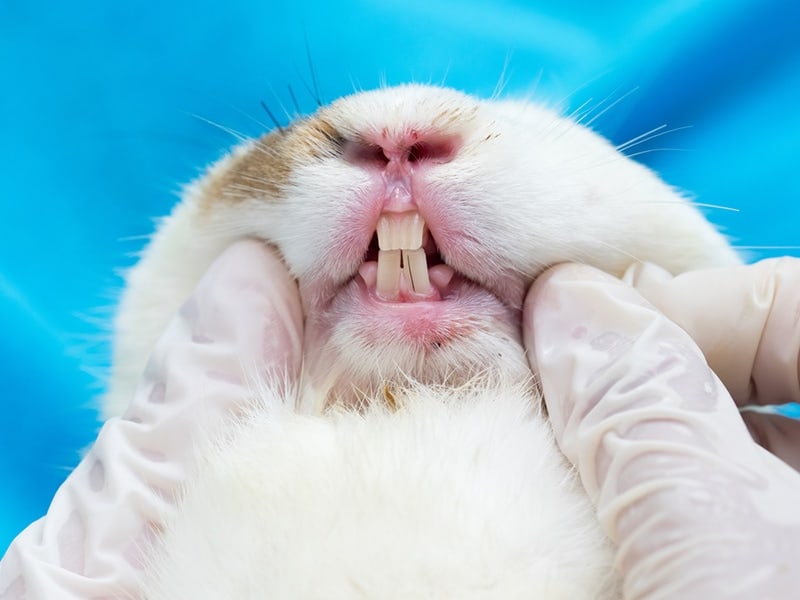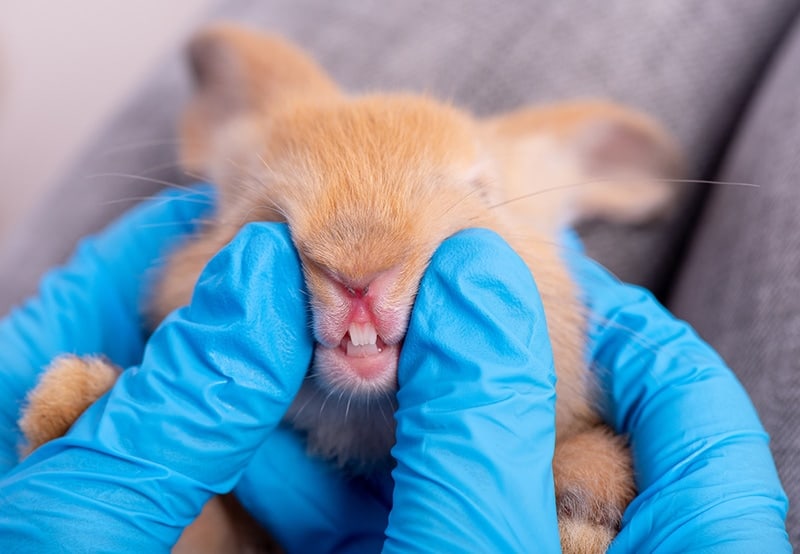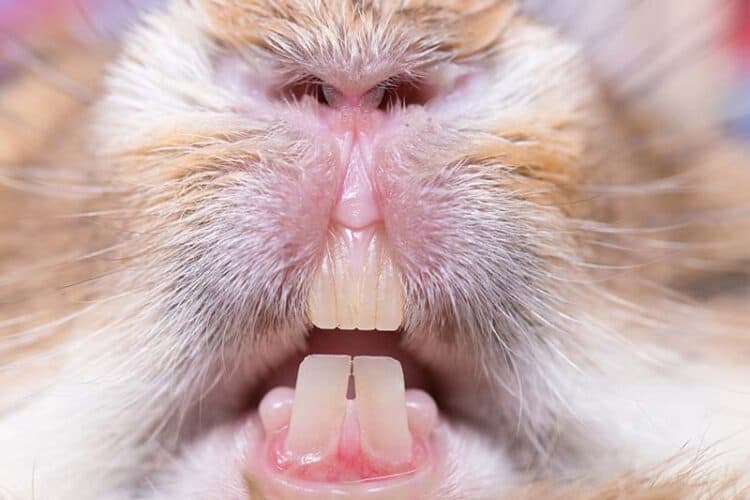Rabbits are generally hard to read, but if you are paying extra close attention, there may be some peculiar behaviors that you are not familiar with. Tooth grinding is one of these behaviors, and this behavior can indicate various things, so it’s important to recognize it so you can determine how your rabbit is feeling. Teeth grinding is a means of communication for rabbits, like purring is to cats and barking is to dogs. It is a way for them to express how they are feeling, and in this case, it could be no need to worry but may also be a cause for concern.
In this article, we’ll discuss rabbit teeth grinding, the different types, and why they do it so you can better understand your rabbit.
Rabbit Teeth Grinding – What Is It?
Rabbit teeth grinding is an involuntary behavior that rabbits exhibit, whether they’re happy and comfortable or in pain. You may notice that when you pet your rabbit or when your rabbit is sleeping, they may grind their teeth. In that case, there is no need to worry, and you should feel satisfied with the fact that you are doing a good job as a rabbit owner. However, if the grinding is loud, where you can hear it without having to get too close to your rabbit, it may indicate that your rabbit is in pain or experiencing discomfort.
Rabbit teeth grinding is generally a normal behavior, but understanding the two types of teeth grinding can determine if your rabbit is happy or uncomfortable.

What Are the Different Types of Teeth Grinding?
There are two types of rabbit teeth grinding: soft grinding or purring and aggressive grinding. A relaxed and happy rabbit displays purring and can sound like teeth clicking, which can almost be inaudible. You may only hear it when you are close to your rabbit’s face. The rhythmic sound may increase slightly if you pet them and hit the sweet spot.
Aggressive grinding is much more audible and can often be heard without getting too close to your rabbit’s face. It is an inconsistent sound with short pauses. This usually indicates that your rabbit may be in pain or experiencing discomfort. If you hear this grinding, it should not be ignored, and you should see a vet as soon as you can to determine the reason for the behavior.
Why Do They Do It?
If the grinding is subtle and happens during petting, your rabbit is happy, comfortable, and feels safe. Your rabbit may also flop over after playtime and fall asleep while purring.
However, aggressive grinding indicates something more serious. If your rabbit is feeling stressed or anxious, it could cause their teeth to grind. It can also make your rabbit more susceptible to illness. Rabbits can be easily stressed, and some common triggers include:
- Changes in routine
- Being left alone too often
- Loud noises
- Visits to the vet
- The presence of a predatory animal
- Small and unsanitary living conditions
- Excessive handling
- Grief
If your rabbit is grinding their teeth and drooling, it could indicate a condition known as ptyalism. This condition is often a result of dental disease, misaligned teeth, and oral abscesses. That is why it is so important for your rabbit to have a constant supply of good quality hay, as it helps them grind down their teeth and maintain their oral health.

This condition can cause pain which encourages tooth grinding. Drooling is just one other sign of ptyalism, but other signs include:
- Wet fur and bare skin around the mouth
- Weight loss
- Loss of appetite
- Asymmetry in the face
- Discharge from the nose or nose
How To Know If Your Rabbit is in Pain
There are various other reasons your rabbit may be experiencing pain. Alongside tooth grinding, key warning signs that a rabbit is in pain include:
- Retreating and not engaging with humans or other pets
- Lack of grooming
- Lack of appetite
- Refusing to drink
- Reluctance to exercise or play
- Not sleeping
- Biting or nipping when being handled
- Unusual posture
Importance of Pain Management for Your Rabbit
If your rabbit is experiencing pain that is not managed or treated, it can cause further health issues. Excessive pain can be fatal, and it can cause your rabbit to go into shock. This can result even if the injury isn’t life-threatening, so managing your rabbit’s pain is very important. If your rabbit is aggressively grinding their teeth and showing other signs of pain or discomfort, contact your vet as soon as possible.
You will need to manage your rabbit’s pain and decrease stress by getting to the root of the problem and treating it accordingly. The sooner the rabbit returns to normal behavior and eating habits, the better.

Frequently Asked Questions (FAQs)
How Do I Prevent Tooth Grinding?
Teeth grinding can’t always be prevented, but keeping your rabbit happy and healthy can help prevent stress and pain. Ensure your rabbit is fed a high-quality diet, gets regular exercise and playtime, has a safe, spacious, and clean hutch, and is not left alone for long periods. Try to keep stress triggers to a minimum and monitor your rabbit for any unusual behavior or signs of pain.
Is My Rabbit Purring or Grinding Its Teeth?
If your rabbit’s teeth grinding is almost inaudible and occurs while you are petting them or while they’re sleeping, they’re purring and happy. If the grinding is loud and your pet shows other signs of pain or stress, such as drooling, hiding, and lack of appetite, it could mean there is a more serious health issue.
What Does It Mean if My Rabbit Stops Purring?
Purring is a sign that your rabbit feels safe and happy, but if they stop purring, it could be because they may feel agitated or restless, especially when held for too long. If your rabbit starts to dig or scratch your lap, grunts and nudges, nips, or urinates, it’s time to put them down.

A Quick Reference Guide- The Difference Between Tooth Grinding & Purring
| Tooth Grinding | Tooth Purring |
| Infrequent | Hard to hear |
| Sounds aggressive | Relaxed |
| Agitated | Rhythmic |
| Alert and fearful | Eyes are relaxed |
Final Thoughts
In a short time, you will get to know your rabbit’s behavior and know when something is off. Rabbits are vocal creatures, so if you can hear aggressive grinding, you should look more into why your rabbit is doing this, as it could indicate stress or pain. If your rabbit is experiencing pain, visiting your veterinarian as soon as possible is vital. If you notice an almost inaudible grinding while your rabbit is sleeping or while you are petting them, your pet is comfortable and content, and you have no cause for concern.
Featured Image Credit: Roselynne, Shutterstock
















